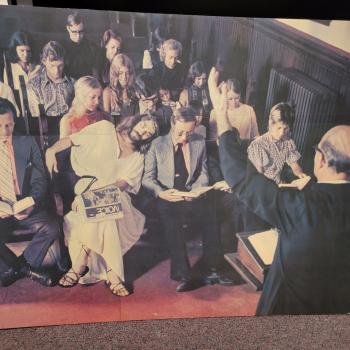BEN: I entirely agree with you that Gen. 1.26 and 3.22 is not about the Trinity but rather about God and his heavenly council. As you say on p. 64. n.14, that God announces to the ‘us’ the project of making humans in his image makes no sense if he is talking to the rest of the Godhead who already knows this, being omniscient. So instead, this is a revelation to the angels or supernatural beings that make up God’s heavenly council. I also agree that “the Trinity is never transparently expressed in the OT”. What this means to me is that without a clear understanding of the progressive nature of God’s revelation and also the gradual increasing understanding of that revelation by the recipients of the revelation we can’t really make sense of the Bible. A flat and abstract view of the Bible that does not taking into account salvation history and progressive revelation simply does not do justice to the nuances and subtle way revelation works. Comments???
MICHAEL: I think that certain biblical writers do have a theology of a Godhead if what we mean by that is a sense that God can be more than one person extant at the same time. As Benjamin Sommer (Jewish Theological Seminary in NY) has shown in his book Bodies of God, that way of thinking is a lot older than the Hebrew Bible. So it’s no surprise to me that we’d find this sort of thought in the Hebrew Bible. The binitarian model is, I think, pretty easy to demonstrate. I also think this approach to God / Godhead is the way biblical writers adapted the regent/co-regent structure of the Canaanite divine council leadership (see my BBR article on that (vol 26, no 2, 2015). They couldn’t have two distinct deities in charge, but they could have Yahweh in both “slots” of leadership. The Spirit (it seems to me) gets looped into the “two-ness” in later biblical texts in a couple places. But none of that is refined, precise Trinitarian thinking (and if we’re honest, it took quite a while to articulate what we’d now call precise thinking in that regard even from the New Testament). But the New Testament writers observed, understood, preserved (i.e., didn’t undermine), and repurposed Old Testament thinking in the way they talk about God, Jesus, and the Spirit and their relationship to one another. The New Testament builds on the foundation of the Old Testament. A Trinitarian theology is not a late contrivance.

















